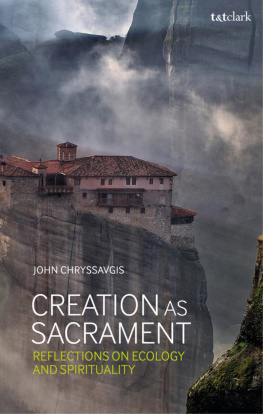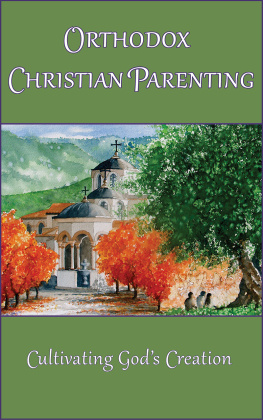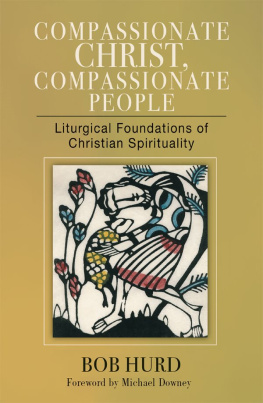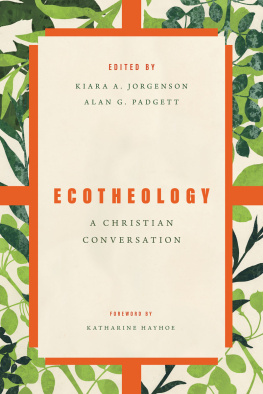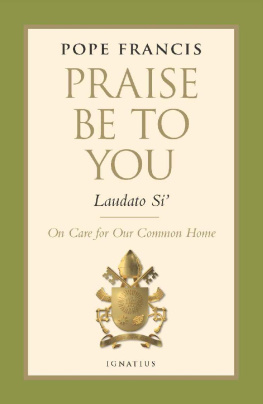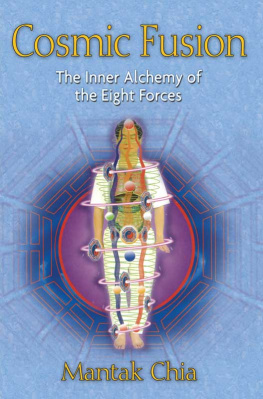Content

Creation as Sacrament
In this timely book, John Chryssavgis offers a sacramental account of the natural world as a creation that finds its true identity in Christ as the body of Christ. It is rare to find a book that is attentive to the sciences, theologically rich, and able to speak practically to some of the major challenges that we are currently facing in this world. Creation as Sacrament succeeds on all these fronts and should have pride of place on the bookshelf of anyone interested in the doctrine of creation. There is no question in my mind that this is one of the best books available on theology and ecology.
Andrew Torrance, University of St. Andrews, UK; coeditor of Knowing Creation: Perspectives from Theology, Philosophy and Science
It is difficult in a few lines to do justice to this beautifully written and inspirational book. The author weaves together a rich tapestry of ideas on the theme of creation as sacrament drawn from Orthodox traditions and practices in a way that can inspire real hope in the transfiguration of the shattered image of the world around us. The reader is taken into a profound recognition of different aspects of the mystery of divine revelation that is both revealed and concealed at the same time. The frank acknowledgment of human sin sits alongside a call to asceticism and gratitude. This is not just about promoting a change in attitude to ecological responsibility in the light of scientific knowledge, but a vision of the church that is both ancient and fresh in its relevance for our world today. This is theological writing at its best: profound, informed, inspiring, and relevant, not just for those in the Orthodox Church, but for many others as well.
Celia Deane-Drummond, University of Notre Dame, USA; author of A Primer in Ecotheology: Theology for a Fragile Earth
Long before the current ecological crisis, the theology of Eastern Christianity had developed a sophisticated and harmonious picture of the interweaving of spiritual and material reality in a universe animated at every point by the radiant, creative agency of God. For human beings to flourish as God intends, they need to learn how to see and attend to this mystery; the contemplation of the divine can grow in us only as we learn to recognize this uncreated act as reflected in all we encounter. John Chryssavgis has played a major role in articulating the resources of Orthodox theology in tackling our environmental catastrophe, and this excellent book could not be more timely as we seek for a spirituality that will genuinely transform our sinful and mindless ravaging of Gods world.
Dr. Rowan Williams, former Archbishop of Canterbury and currently Master of Magdalene College, University of Cambridge, UK; author of Christ, The Heart of Creation
John Chyrssavgiss capacious, reflective book is a wonderful, rigorous, and accessible meditation on ecological theology as intrinsic to Orthodox Christian thought and practice over the centuries. His theological finesse is unique and unparalleled in mediating Orthodox thought between the currents of contemporary environmentalism and theological shoals of the past. Readers of all levels will benefit from his reflections on how transfiguration, sacrament, and spirituality in Orthodox theology resist any blithe, firm distinctions between humans and nature. Eminently readable and assignable, this text is also guaranteed to become a staple in courses on Christian ecotheology.
Christiana Zenner, Fordham University, USA; author of Just Water: Theology, Ethics, and the Global Water Crisis
Creation as Sacrament
Reflections on Ecology and Spirituality
John Chryssavgis

T&T CLARK
Bloomsbury Publishing Plc
50 Bedford Square, London, WC1B 3DP, UK
1385 Broadway, New York, NY 10018, USA
BLOOMSBURY, T&T CLARK and the T&T Clark logo are trademarks of Bloomsbury Publishing Plc
First published in Great Britain 2019
Copyright John Chryssavgis, 2019
John Chryssavgis has asserted his right under the Copyright, Designs and Patents Act, 1988, to be identified as Author of this work.
For legal purposes the constitute an extension of this copyright page.
Cover design: Terry Woodley
Cover image The Holy Monastery of Roussanou at Meteora, Thessaly, Greece. Photo by Dimitrios Tilis/Getty
All rights reserved. No part of this publication may be reproduced or transmitted in any form or by any means, electronic or mechanical, including photocopying, recording, or any information storage or retrieval system, without prior permission in writing from the publishers.
Bloomsbury Publishing Plc does not have any control over, or responsibility for, any third-party websites referred to or in this book. All internet addresses given in this book were correct at the time of going to press. The author and publisher regret any inconvenience caused if addresses have changed or sites have ceased to exist, but can accept no responsibility for any such changes.
A catalogue record for this book is available from the British Library.
Library of Congress Cataloging-in-Publication Data
Names: Chryssavgis, John, author.
Title: Creation as sacrament : reflections on ecology and spirituality / John Chryssavgis.
Description: 1 [edition]. | New York : T&T Clark, 2019. | Includes bibliographical references and index.
Identifiers: LCCN 2019007759 | ISBN 9780567680709 (pbk.) | ISBN 80567680716 (hardback) | ISBN 9780567680723 (epub) | ISBN 9780567680730 (epdf)
Subjects: LCSH: Creation. | EcologyReligious aspectsChristianity. | Wisdom (Biblical personification)
Classification: LCC BT695.5 .C4975 2019 | DDC 231.7/65dc23
LC record available at https://lccn.loc.gov/2019007759
ISBN: HB: 978-0-5676-8071-6
PB: 978-0-5676-8070-9
ePDF: 978-0-5676-8073-0
ePUB: 978-0-5676-8072-3
To find out more about our authors and books visit www.bloomsbury.com and sign up for our newsletters.
CONTENTS
I am grateful to a great cloud of witnesses (Heb. 12:1), who helped shape this book. Among them, especially:
His All-Holiness Ecumenical Patriarch Bartholomew : Thank you for your persistent advocacy of caring for Gods creation. Your decisive leadership and humble ministry have taught me that Orthodox Christianity can actually make a difference in our world.
His Eminence Metropolitan John of Pergamon : Thank you for your bold approach and eloquent theological voice on creation care, as well as for the gracious Foreword to this publication.
My son Alexander : Thank you for motivating me to live more simply, subsist with less, and tread lightly on our planet.
My son Julian : Thank you for opening my eyes to the intimate and intricate connections between economy and ecology, as well as property and poverty for a fairer world and just society.
My editor Marilyn Rouvelas : I have literally run out of words to express my gratitude sufficiently or efficiently. Thank you for your affectionate ownership, generous championship, and faithful stewardship of this book.
For a very long time, it was assumedby religion and science alikethat theology has very little to do with ecology; the environmental crisis and climate change were matters handled only by specialists and technocrats, by politicians and activists. In reality, however, the relationship between theology and ecology is profound and pronounced, even while the reasons for any misunderstanding are positive and negative.
From a positive perspective, Scripture and tradition underline the sanctity and dignity of all creation, including the animals and the natural and material environment, which humans must respect and treat as a gift of the divine Creator. Christ came to save the whole creationand not just humankindthrough the Incarnation; this is why, according to St. Paul, the whole creation groans in travail and is suffering (Rom. 8:23) as it awaits its salvation through humanity.

